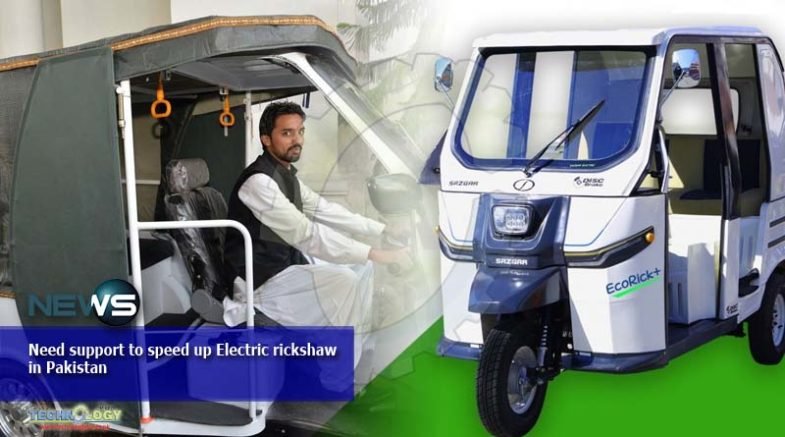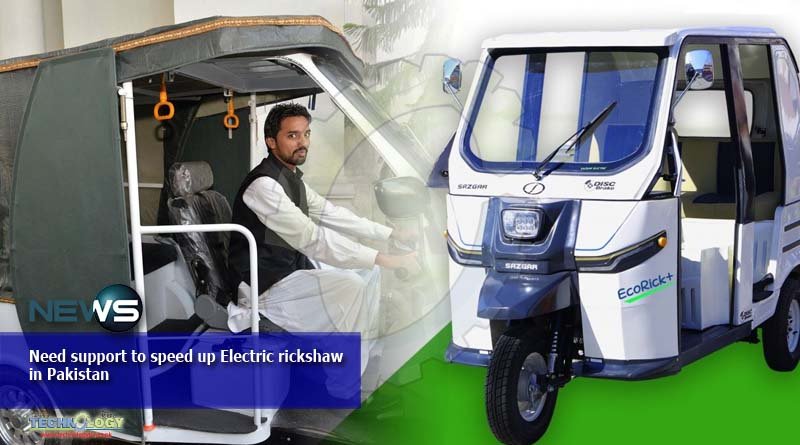Electric three-wheeled rickshaw start in Pakistan first time for building momentum for its shift to electric vehicles reducing air pollution and control climate change.
 It has been four months since Prime Minister Imran Khan’s cabinet approved the National Electric Vehicle Policy, offering tax exemptions and incentives to manufacturers, importers and buyers of electric vehicles.
It has been four months since Prime Minister Imran Khan’s cabinet approved the National Electric Vehicle Policy, offering tax exemptions and incentives to manufacturers, importers and buyers of electric vehicles.
Sales head at Sazgar Engineering Works Limited, which launched the country’s first electric rickshaw in January Syed Ismail Ghaznavi said that the electric rickshaws have comparatively much lower running and maintenance costs.
He informed that Sazgar’s electric rickshaw can travel up to 170 km (105 miles) on a charge, has almost no moving parts which means fewer trips to the mechanic – and produces zero emissions. But we need the government support to roll it out on a larger scale for the public.
In the policy it approved in November, the government set a target to bring half a million electric motorcycles and rickshaws, along with more than 100,000 electric cars, buses and trucks, into the transportation system in the next five years.
Prime minister’s advisor on climate change Malik Amin Aslam said that the government wants to have about one-third of the vehicles in Pakistan running on electrical energy, by 2030,
He further said that the move to electric vehicles is “a win-win strategy” it should reduce emissions by nearly three-quarters and cut the cost of running a vehicle by 60%. Pakistan generates less than 1% of global greenhouse gas emissions, but it is one of the countries that suffers most from the effects of climate change, including flooding, droughts, heat waves and melting glaciers, environmental experts say.
The Global Climate Risk Index 2020, issued by environmental think-tank Germanwatch, ranked Pakistan fifth among the 10 countries most affected by extreme weather over the last 20 years.
As it tries to spark an electric mobility revolution, Pakistan is following countries such as Norway, France and the United Kingdom, all of which have said they will ban sales of petrol and diesel vehicles within the next 20 years. Pakistan’s government plans to use a raft of monetary incentives to convince the country’s auto manufacturers and the public to switch to environmentally friendly modes of transport.
To encourage prospective buyers, the government says it aims to lower or do away with various taxes on electric vehicles and bring down customs duty for imported parts to 1%.
Chairman of the Awami Rickshaw Union Majeed Ghauri, which represents the country’s rickshaw drivers, said the group welcomed the government’s announcement of special incentives to promote electric rickshaws. But the government should find a way to make electric rickshaws cheaper than traditional ones – which can cost up to 270,000 rupees ($1,700) – to make them affordable for low-income drivers.
Chairman of the Pakistan Electric Vehicles Manufacturers Association Muhammad Sabir Shaikh said he is confident the switch to electric will prove successful “in a very short span of time”, reducing air pollution and boosting investment in the country’s auto sector.
